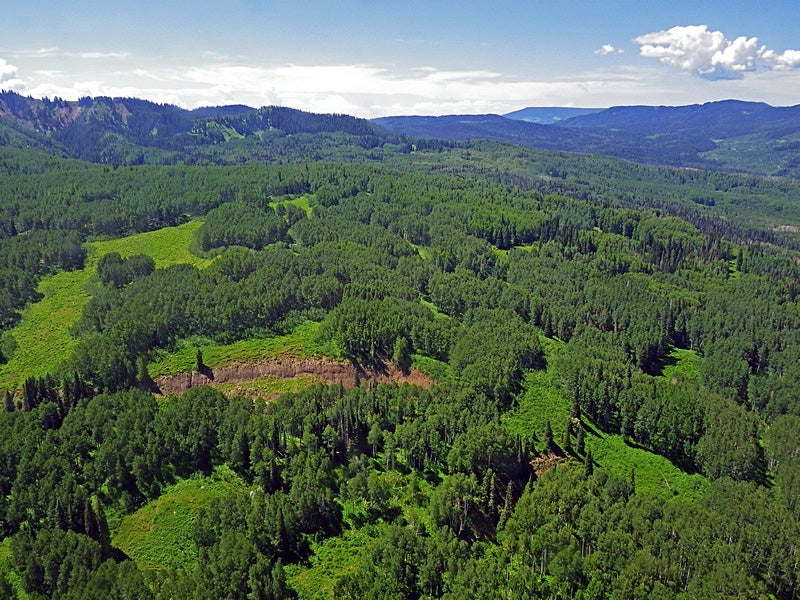Drillers Make a Play for Thompson Divide
There is no dispute that the Thompson Divide—a 220,000-acre forested wildland in western Colorado—is a special place. It comprises some of the most valuable and diverse mid-elevation forested landscapes in Colorado and includes the headwaters of streams that sustain the Crystal, Roaring Fork and North Fork valleys. Thompson Divide is a prized destination for recreationists…

This page was published 12 years ago. Find the latest on Earthjustice’s work.
There is no dispute that the Thompson Divide—a 220,000-acre forested wildland in western Colorado—is a special place. It comprises some of the most valuable and diverse mid-elevation forested landscapes in Colorado and includes the headwaters of streams that sustain the Crystal, Roaring Fork and North Fork valleys. Thompson Divide is a prized destination for recreationists and tourists, and supports a long tradition of ranching. Perhaps most importantly, with no fewer than nine roadless areas, the Divide includes the largest complex of non-Wilderness roadless lands left in Colorado. The Thompson Divide is clearly a keystone of the region, the state and the West.
The debate over the Thompson Divide focuses on its future: should it remain intact, providing the extraordinary ecological and economic values that have benefited local communities and wildlife for generations, or should it be transformed into an industrial zone to produce natural gas for the highest bidder?
This week, attorney Michael Freeman, representing Carbondale-based Wilderness Workshop, took action to keep the Thompson Divide intact. His petitions to the State Director of the Colorado Bureau of Land Management challenged BLM’s April decisions that extended the lives of 25 oil and gas leases located in the Divide on the White River National Forest. These leases were due to expire this year. Unless BLM’s extensions are reversed, the leases remain alive for at least another year and may yet see development.
Simulated natural gas development along the Thompson Divide. (Skytruth)
If these oil and gas leases, issued during the Bush administration, were drilled and developed, the industrialization of western Colorado over the last decade would reach the heart of the Divide, including extensive portions of designated roadless areas. The heavy truck traffic, spills, and air, water and noise impacts of modern intensive energy development are not compatible with the qualities for which the Thompson Divide is valued.
Fortunately, the leases have sat undeveloped for their entire lifespan. The BLM, which administers all federal onshore mineral rights, including those underlying National Forests, issues leases for a 10-year period. In order to prevent speculation by energy companies, lessees are required to show due diligence in developing the leases during that period. On these leases, the companies have not demonstrated any interest in upholding their end of the bargain.
Incredibly, earlier this year the two companies holding the leases asked BLM to extend the leases by suspending them. Suspension stops the 10-year clock, artificially extending the period that the companies may hold the leases. Despite fierce local opposition, the BLM granted the suspension requests in early April. The suspensions were made on questionable grounds that disregarded directions in BLM’s Manual and did not comply with federal law.
When considering the suspension requests, BLM found that the leases had been illegally sold in violation of NEPA. What’s more, the leases were issued without express stipulations requiring compliance with the roadless rule.
Yet, rather than voiding the leases it acknowledges were issued illegally, BLM gave itself one year to figure out what it will do. Wilderness Workshop, with Earthjustice’s help, is now asking the BLM State Director to overturn the suspensions and allow the clock to run out.
The debate over the Thompson Divide focuses on its future. (EcoFlight)
The effort to keep the Thompson Divide intact has attracted immense support in the region. A coalition of local governments—Pitkin County, Glenwood Springs, and Carbondale—have also filed a challenge to the extension. Groups and individuals such as the Thompson Divide Coalition and Senator Michael Bennet are working to secure long-term protection for this special place. In the meantime, Earthjustice and Wilderness Workshop are working to halt the immediate threats and keep the path to a positive future open for the Divide.
Follow Doug on Twitter at @dpflugh_ej
Earthjustice’s Rocky Mountain office protects the region’s iconic public lands, wildlife species, and precious water resources; defends Tribes and disparately impacted communities fighting to live in a healthy environment; and works to accelerate the region’s transition to 100% clean energy.